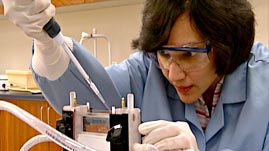Teachers' Domain - Digital Media for the Classroom and Professional Development
User: Preview


Source: Pathways to Technology: "Biotechnology Intro"
In this video excerpted from Pathways to Technology, you’ll learn about biotechnology: the science of using living organisms to create new products, from drugs to fuels. Genetic engineering is a booming field in biotechnology, as scientists learn how to engineer living organisms to produce useful proteins. The need for people with biotechnology skills is always growing, and there is a wide range of possible careers available within the field.
Biotechnology is a science that combines biology and chemistry, in the study of living organisms. Often the goal of biotechnology is to create new products or treatments for diseases. Sometimes this involves creating a modified organism through genetic engineering. Most biotechnology work takes place in the pharmaceutical industry, where new drugs to fight cancer and other diseases are developed by manipulating the DNA of living cells. Biotechnology has advanced our understanding and application of genetics and genetic engineering, and has changed the world of medicine.
Advances in biotechnology have also had a huge impact on fields beyond medicine. DNA testing in crime labs, the complete mapping of the human genome, cloning, engineering human tissue, genetically modifying plants and food, and building (or defense against) biological weapons—all benefit from biotechnology.
There are many careers open to a community college biotechnology graduate, including quality control technician, manufacturing technician, and lab assistant. As a quality control technician in biotechnology, you'll analyze raw materials and products to make sure they meet federal regulations for required levels of quality. A biotechnology manufacturing technician assists in the manufacturing of products that are created by biotechnology companies. These might include drugs for pharmaceutical companies, or food additives for the food industry. You'll work with equipment that ranges from the very large (huge vats of raw materials) to the very small (precision measuring instruments). As a biotechnology laboratory assistant, you'll assist with the setup of scientific experiments, which might focus on anything, from the testing of a new drug for the pharmaceutical industry, to the production of a synthetic fiber for use in the clothing industry. Career opportunities in biotechnology continue to grow and evolve along with the field.
 Loading Standards
Loading Standards